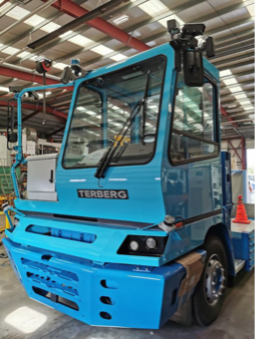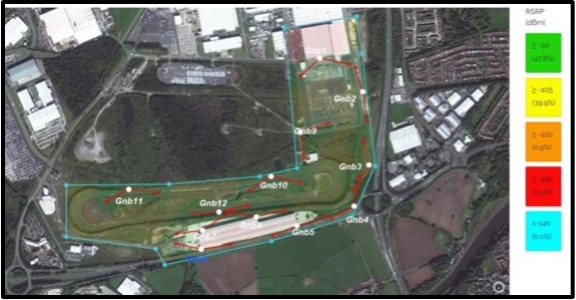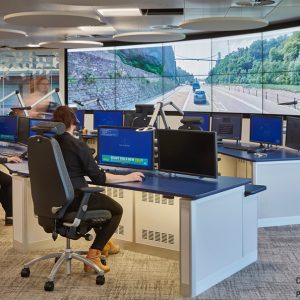What is 5G CAL?
5G CAL (5G Connected Automated Logistics) involves building an outdoor 5G 
The question we are seeking to answer is ‘can an autonomous EV-HGV be remotely controlled (or teleoperated), potentially removing the safety driver, reducing cost and improving operational efficiency.’
Project Partners include:
The Project
The project has involved the creation of a private 5G network that allows for the secure reliable and ultra-fast communications between the EV-HGV and the operations centre. This uses several of the key features and benefits of 5G, namely:
- Devices talking to each other = machine to machine type communications
- ‘Instant, Assured Action’ = Ultra Reliable low latency communications
- Massive throughput of data = Enhanced Mobile Broadban
- Secure communications = Secure by Design
Aside from the core goal of proving the use of an autonomous HGV and its teleoperation on a live industrial site. The project is also developing several additional use cases including how the EV-HGV can interact with infrastructure, using a series of smart and LiDAR cameras along the route to improve safety and decision making. The communications network has been extended to include connection to the Skills Academy for Sustainable Manufacturing and Innovation (SASMI), that will underpin the Driving the Electric Revolution workspace installed there.
Cyber security is critical, so project partners Coventry University are working to understand and mitigate against any design weaknesses and vulnerabilities from a cybersecurity perspective.
A separate team at Newcastle University is also working alongside project workstreams to explore the potential for 5G enabled autonomous vehicles to be deployed more widely in other industrial and social settings.
Potential benefits
The initial proposal identified a number of potential benefits that the project is seeking to validate. These include the efficiency savings of removing the safety driver from an autonomous vehicle – This has been estimated as saving £2.5M each year for this site alone and improvements in operational efficiency as a result.
What is Perform Green's role?
As partners in the project, Perform Green have been involved from its conception, are investors in the testbed, and are providing technical and operational oversight across the programme. Our role has included:
Bid writing
Our team were involved from the very earliest stage of the project, working through our strategic relationship with Sunderland City Council to write the successful 5G Create bid to DCMS wth input from all the partners. This involved identifying the key use cases for the 5G technology and securing the involvement of a number of the strategic partners to develop the solution.
Specification development
Following the successful project funding award, the Perform Green team turned their attention to writing the 5G network specification, and, after a series of stakeholder workshops across our strategic partners, developed a comprehensive list of functional and non-functional requirements. This identified key aspects the network needed to deliver on, which included a 100Mbps throughput a latency of sub 10ms and the ability to operate within N77, using the Ofcom shared access spectrum.
Procurement support
Working with project partners Sunderland City Council and the North East Automotive Alliance, we identified the most appropriate procurement route, and supported the procurement of the prime contractor to build deliver and maintain the 5G network. Richard Barrington and Barney Smith were expert assessors during the procurement providing insight into the technical components of the tender responses.
Project assurance
Because of our experience in managing complex projects Perform Green’s role includes ensuring that all project deliverables meet the requirements agreed with DCMS. The Perform Green team have a particular focus on technical deliverables, such as the design and implementation of the 5G network, and oversight of information security, with members of the team working with colleagues at Coventry University to define specifications and review their written documentation. All reports are evaluated against 3GPP and UK Government Information Management guidelines.
Workstream leads (Technical and Collaboration)
Perform Green are the assigned workstream leads for both the Technical and Collaboration workstreams of 5G CAL. We are responsible for the delivery and implementation of the 5G network across the site and the successful testing of the autonomous HGV against the 5G Network. In addition we are leading collaboration with the other 5G testbeds ensuring valuable lessons are shared and a set of best practice guidelines for future 5G programmes are developed.
With the testbed running until March 2022, the 5G CAL team are now approaching the final testing phase with the modified HGV due for teleoperation and autonomous trials in the autumn. Preliminary trials have already been completed around the site using a modified NV200 test mule providing valuable data and showing promising latency results.
For more information about the 5G CAL project or to explore 5G for your organisation, community, or locality, please contact us for an exploratory conversation.



















